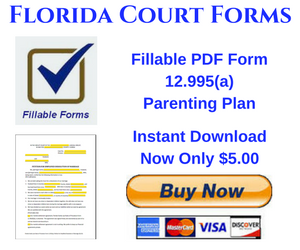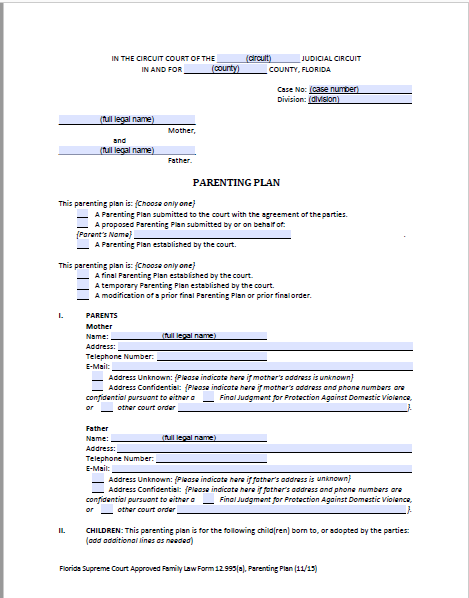Florida Shared Parenting Plan
Time Sharing Parenting Plan Instructions
A Parenting Plan is required in all cases involving time-sharing with
minor children, even when time-sharing is not in dispute.
This legally establishes the conditions and circumstances for time sharing, and can also establish custody, visitation, and decision making authority regarding the children as it pertains to time sharing and living arrangements.
This shared parenting plan form or a similar form
should be used in the development of a Parenting Plan.
When to Use the Shared Parenting Plan
If the case involves supervised time-sharing, the Supervised/Safety Focused Parenting Plan, Florida Supreme Court Approved Family Law Form 12.995(b) or a similar form should be used.
This shared parenting plan form should be typed or printed in black ink.
If an agreement has been reached, both parties must sign the shared Parenting Plan and have their signatures witnessed by a notary public or deputy clerk.
After completing this shared parenting plan form , you should file the original with the clerk of the circuit court in the county where the petition was filed and keep a copy for your records.
You should then refer to the instructions for your petition, answer, or answer and counterpetition concerning the procedures for setting a hearing or trial (final hearing).
If an agreed shared Parenting Plan is not filed by the parties, the Court will establish a Plan.
For further information, see chapter 61, Florida Statutes, and the instructions for the petition and/or answer that were filed in this case.
The Twelfth Judicial Circuit has an excellent on-line page about Florida Parenting Plans. Highly recommended.
What Should be Included in a Time-Sharing Plan
At a minimum, the share Parenting Plan must describe in adequate detail:
- How the parties will share and be responsible for the daily tasks associated with the upbringing of the children,
- The time-sharing schedule arrangements that specify the time that the minor children will spend with each parent,
- A designation of who will be responsible for any and all forms of health care, school-related matters, other activities, and
- The methods and technologies that the parents will use to communicate with the children.
Best Interests of the Children
The best interests of the children is the primary consideration in the Shared Parenting Plan.
In creating the Parenting Plan, all circumstances between the parties, including the parties’ historic relationship, domestic violence, and other factors must be taken into consideration.
Determination of the best interests of the children shall be made by evaluating all of the factors affecting the welfare and interest of the minor children, including, but not limited to:
- The demonstrated capacity and disposition of each parent to
facilitate and encourage a close and continuing parent-child
relationship, to honor the time-sharing schedule, and to be reasonable
when changes are required;
- The anticipated division of parental
responsibilities after the litigation, including the extent to which
parental responsibilities will be delegated to third parties;
- The demonstrated capacity and disposition of each
parent to determine, consider, and act upon the needs of the children
as opposed to the needs or desires of the parent;
- The length of time the children has lived in a stable, satisfactory environment and the desirability of maintaining continuity;
- The geographic viability of the parenting plan,
with special attention paid to the needs of school-age children and the
amount of time to be spent traveling to effectuate the parenting plan.
This factor does not create a presumption for or against relocation of
either parent with a children;
- The moral fitness of the parents;
- The mental and physical health of the parents;
- The home, school, and community record of the children;
- The reasonable preference of the children, if the
court deems the child(ren) to be of sufficient intelligence,
understanding, and experience to express a preference;
- The demonstrated knowledge, capacity, and
disposition of each parent to be informed of the circumstances of the
minor children, including, but not limited to, the children’s friends,
teachers, medical care providers, daily activities, and favorite things;
- The demonstrated capacity and disposition of each
parent to provide a consistent routine for the children, such as
discipline, and daily schedules for homework, meals, and bedtime;
- The demonstrated capacity of each parent to
communicate with and keep the other parent informed of issues and
activities regarding the minor children, and the willingness of each
parent to adopt a unified front on all major issues when dealing with
the children;
- Evidence of domestic violence, sexual violence,
child abuse, child abandonment, or child neglect, regardless of whether a
prior or pending action relating to those issues has been brought;
- Evidence that either parent has knowingly
provided false information to the court regarding any prior or pending
action regarding domestic violence, sexual violence, child abuse, child
abandonment, or child neglect;
- The particular parenting tasks customarily
performed by each parent and the division or parental responsibilities
before the institution of litigation and during the pending litigation,
including the extent to which parenting responsibilities were undertaken
by third parties;
- The demonstrated capacity and disposition of each
parent to participate and be involved in the children’s school and
extracurricular activities;
- The demonstrated capacity and disposition of each
parent to maintain an environment for the children which is free from
substance abuse;
- The capacity and disposition of each parent to
protect the children from the ongoing litigation as demonstrated by not
discussing the litigation with the children, not sharing documents or
electronic media related to the litigation with the children, and
refraining from disparaging comments about the other parent to the
children; and
- The developmental stages and needs of the child(ren) and the demonstrated capacity and disposition of each parent to meet the children’s developmental needs.
This standard shared parenting plan form does not include every possible issue that may be relevant to the facts of your case.
The shared Parenting Plan should be as detailed as possible to address the time-sharing schedule.
Additional provisions should be added to address all of the relevant factors. The parties should give special consideration to the age and needs of each child.
In developing the shared Parenting Plan, you may wish to consult
or review other materials which are available at your local library, law
library or through national and state family organizations.
Legal Documents Preparation Services
Your legal documents ready to file at a price you can afford!
Legal Documents Preparation Services
Your legal documents ready to file at a price you can afford!

Our Petition Preparer Service can have all your documents professionally prepared after a brief interview with our experienced Legal Document Specialists.
Your court papers will be in your hands and ready to file in as little as three days! We guarantee our work. Just ask us for a quote.
|


